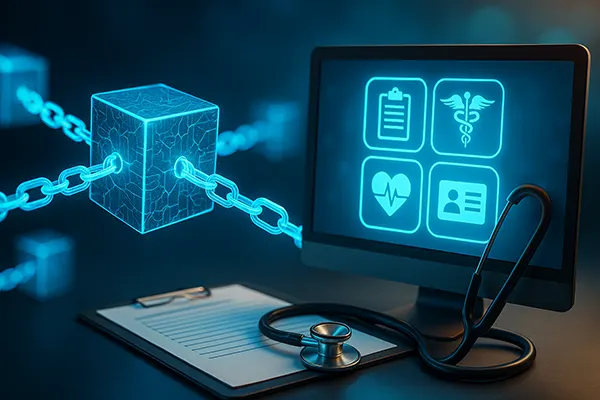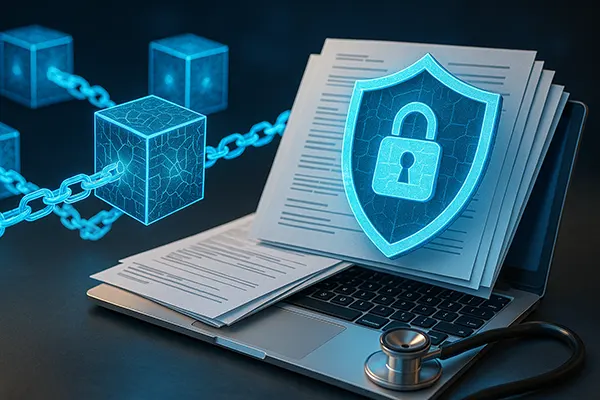Blockchain for Healthcare: How Distributed Databases Secure Medical Data in 2025

In 2025, the use of blockchain technology in healthcare has moved beyond experimentation and niche projects. It now plays a pivotal role in how medical data is managed, secured, and accessed across various national and private systems. Thanks to the inherent properties of distributed ledgers — immutability, transparency, and decentralised control — healthcare institutions have started to leverage this technology to protect sensitive health records, ensure patient consent, and improve traceability in clinical workflows.
Blockchain-based Medical Record Projects
One of the most prominent blockchain initiatives in healthcare remains MedRec, originally developed at MIT. As of mid-2025, MedRec has partnered with several European clinics to offer patients control over their data, allowing them to manage permissions via smart contracts. Patients can approve access for specific studies or treatments while maintaining complete ownership.
Healthereum is another ongoing project that connects patient behaviour with blockchain verification. In 2025, it’s being used in telehealth ecosystems to verify attendance, medication compliance, and participation in wellness programmes. Patients receive tokenised rewards for their engagement, promoting proactive health management while reducing administrative overhead.
Meanwhile, Estonia’s national eHealth Authority continues to run its X-Road-based blockchain infrastructure, securing patient histories across institutions. This serves as one of the most successful large-scale implementations of blockchain in public health to date, proving the feasibility of interoperable, decentralised medical systems at the national level.
Benefits of Transparency and Decentralisation
The advantages of blockchain in these projects include improved auditability and reduced fraud. Since every change in the database is logged and cannot be altered retroactively, it creates a tamper-proof medical trail. Doctors, patients, and regulatory bodies can verify the authenticity of data in real time, fostering trust in digital records.
Blockchain also helps reduce dependency on central authorities or data silos. This makes healthcare networks more resilient to cyberattacks and data loss, especially crucial in remote and developing regions. If one node fails, data remains secure and accessible through other nodes.
Moreover, smart contracts have been instrumental in automating insurance claim processing and medical data sharing. These self-executing contracts, built into the blockchain, ensure that predefined conditions must be met before data is shared or payments are triggered — reducing human error and administrative costs.
NFTs and DAOs in Healthcare Data Access
In 2025, new blockchain applications have emerged using Non-Fungible Tokens (NFTs) and Decentralised Autonomous Organisations (DAOs) to redefine data ownership. NFTs, often associated with digital art, are now used to represent ownership of anonymised medical datasets. This allows researchers or institutions to verify data provenance while preserving patient privacy.
For example, a patient can tokenise their genomic data as an NFT and grant a research centre time-limited access. This NFT acts as both a consent instrument and a proof of origin. Blockchain ensures that the data has not been modified and access logs remain public and immutable.
DAOs are also reshaping clinical trial management. Rather than relying on central ethics committees or pharmaceutical sponsors, patients and researchers participate in decentralised governance, voting on trial protocols or data sharing terms. This adds transparency and gives patients a stronger voice in how their data is used.
Practical Implications for Privacy and Consent
These innovations change how consent is handled. Instead of paper forms or e-signatures managed by third parties, smart contracts enforce consent in a programmable way. A patient can revoke access immediately by interacting with the blockchain interface.
Additionally, zero-knowledge proofs — a cryptographic innovation — are increasingly adopted to ensure data can be verified without revealing its content. This adds another layer of privacy, particularly for sensitive conditions like mental health or infectious diseases.
It’s worth noting that these approaches require widespread digital literacy and infrastructure. In 2025, projects are being piloted in university hospitals and urban clinics, but rural deployment still faces technological and economic barriers.

Legal and Ethical Challenges of Blockchain in Medicine
While the benefits are significant, the use of blockchain in healthcare also presents complex legal and ethical challenges. One of the main concerns is data immutability. Once information is stored on a blockchain, it cannot be deleted — which directly contradicts the European General Data Protection Regulation (GDPR) “right to be forgotten.”
This raises issues around data rectification. If a medical error is recorded, blockchain makes it difficult to amend without creating an entirely new record. Therefore, hybrid systems are often used, where only metadata or hashes are stored on-chain, while actual records remain off-chain and editable.
Another concern is jurisdiction. Blockchain systems often span multiple countries, making it difficult to enforce national laws. In 2025, the European Medicines Agency and other regulators are working on new compliance frameworks to standardise cross-border blockchain health applications.
Trust, Accountability, and Ethical Data Usage
From an ethical standpoint, decentralisation complicates accountability. If a patient’s data is compromised or misused within a DAO-governed system, who is responsible? Traditional legal structures are not designed to handle decentralised governance.
To address this, several initiatives have introduced DAO charters — legally binding documents that outline member responsibilities and conflict resolution mechanisms. However, these frameworks are still evolving, and enforcement remains difficult.
Finally, there is an ongoing debate about the monetisation of medical data. While tokenisation empowers patients, critics argue it may incentivise individuals to sell access to sensitive information without understanding long-term risks. Educating users about data ethics remains a key priority for blockchain adoption in healthcare.


